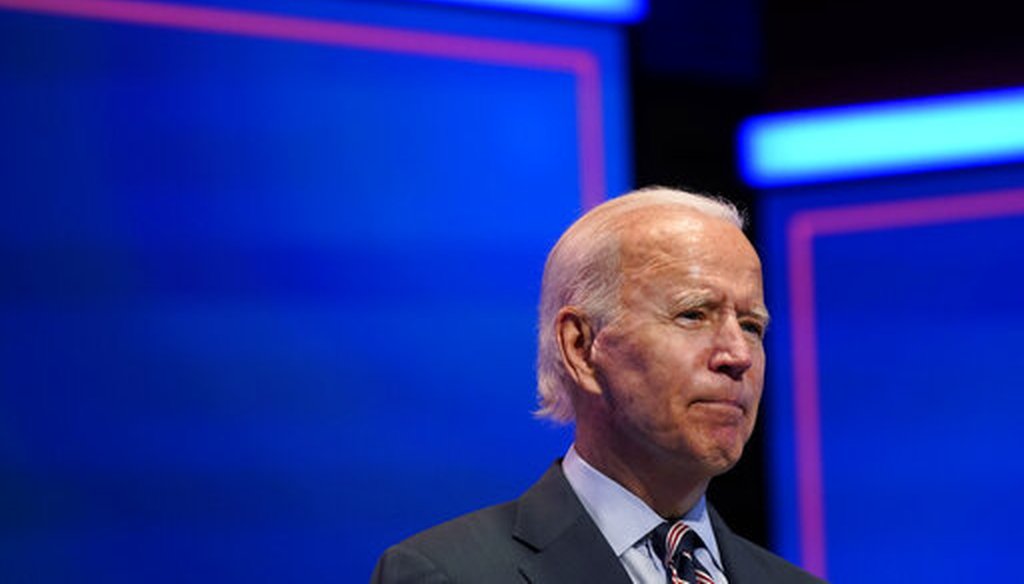Stand up for the facts!
Our only agenda is to publish the truth so you can be an informed participant in democracy.
We need your help.
I would like to contribute

Democratic presidential nominee Joe Biden speaks after participating in a coronavirus vaccine briefing with public health experts on Sept. 16, 2020, in Wilmington, Del. (AP)
If Your Time is short
-
Several of Biden’s remarks on the coronavirus pandemic and vaccine development were generally accurate. However, he exaggerated when he accused the Trump administration of not having a plan.
-
Biden’s expectation for a vaccine — sometime in early to mid 2021 — is echoed by other experts and CDC leadership.
-
Biden accurately portrayed a university’s estimate that 100,000 lives could be saved with universal mask use.
In a speech focused on the nation’s response to the coronavirus pandemic, Democratic presidential nominee Joe Biden poured cold water on President Donald Trump’s talk about an imminent vaccine.
"I trust vaccines. I trust scientists. But I don't trust Donald Trump," Biden said in his Sept. 16 speech in Delaware, which followed a meeting with scientists to discuss coronavirus policy. "And at this moment, the American people can't either."
Biden’s remarks countered the message from Trump that the response is going well and that a vaccine will be ready within weeks.
Several of Biden’s claims were generally accurate or in line with predictions from experts. However, he exaggerated when he accused the Trump administration of not having a plan.
This is accurate for vaccine candidates being developed in the U.S., though at least one overseas trial includes children.
Typically, vaccine trials in children follow trials in adults, Matthew B. Laurens, an associate professor at the University of Maryland School of Medicine, told PolitiFact
The pharmaceutical company Pfizer plans to expand its COVID-19 vaccine trial population to include adolescents as young as 16 years of age and people with chronic, stable HIV, hepatitis C, or hepatitis B.
Another group that has not been included in trials yet is pregnant women, said Evan Anderson, a professor of pediatrics at Emory University School of Medicine who has been among those urging that vaccine trials include children. "This will absolutely delay when a vaccine becomes available for these groups."
Overseas, at least one company, Astra Zeneca, has begun to include children in vaccine trials in the United Kingdom, and the Chinese company Sinovac is planning to test in children later this month.
RELATED: Trump’s false claim that children are ‘almost immune’ to COVID-19
This matches what Robert Redfield, the director of the Centers for Disease Control and Prevention, told senators hours before Biden spoke.
As soon as the vaccine is approved, the federal government wants to distribute it within 24 hours. However, Redfield said while the vaccine will initially be available in November or December 2020, it will be a very limited supply.
"If you're asking me when is it going to be generally available to the American public so we can begin to take advantage of (a) vaccine to get back to our regular life, I think we're probably looking at late second quarter, third quarter 2021," Redfield said.
Trump has a rosier timeline in mind. Later that day, Trump said Redfield "made a mistake" in his testimony and the vaccine "could be announced in October, could be announced a little bit after October."
Redfield’s tempered vaccine message, however, lines up with our previous reporting. Experts told us availability will likely be limited in 2020.
Here’s an updated look at the status of various coronavirus vaccine trials:
Biden is accurately citing the projections, which are updated periodically based on changing conditions. As with any projections, there is room for uncertainty and revision as events unfold.
The White House has used the University of Washington’s Institute of Health Metrics and Evaluation as one factor in its pandemic assessments. The university’s Sept. 11 update said that, due to colder weather and "declining public vigilance," the number of cumulative deaths from the virus by Jan. 1 would reach 415,090.
Given that cumulative deaths were already at 196,485 on Sept. 16, that would represent an increase of 218,605 death’s by year’s end, slightly larger than what Biden said.
In its analysis, the institute added that increasing mask use to the near-universal levels seen in Singapore "would decrease the cumulative U.S. death toll to 298,589, or 116,501 lives saved compared" to the scenario above.
Biden made some general comments about vaccine distribution months ago. On April 27, he briefly mentioned the goal of deploying vaccines globally. On June 30, he called for developing a nationwide vaccination campaign without details.
While speaking about vaccine development on MSNBC July 20, Biden said: "We should have a command officer now, we should be spending $25 billion to put together exactly how that will be distributed to over 300 million Americans. How will we do that? Where will it go? How will we get it done well? It needs planning, planning. And without any planning between now and Election Day now and the time we are sworn in, it’s going to make it incredibly more difficult to get anything done."
At that point the federal government had not published a detailed distribution plan for a vaccine. But Biden failed to account for Operation Warp Speed, the Trump administration’s initiative which aims to deliver 300 million doses of a vaccine by January 2021. There are, in fact, officials in charge: chief adviser Dr. Moncef Slaoui and chief operating officer Gen. Gustave F. Perna.
Two federal committees have been working on recommendations for distributing the vaccine, including proposals for which groups should get it first.
A Biden spokesperson said he was referring to the lack of a national plan for testing, contact tracing and masks.
Hours before Biden spoke, the Trump administration announced its most detailed plan to date regarding how it will distribute vaccines. The plan shows that the federal government aims to make the two-dose vaccine free of cost, for instance.
The CDC gave states a 57-page interim playbook to help them create distribution plans to submit to the federal government by Oct. 16. COVID-19 vaccines and ancillary supplies will be procured and distributed by the federal government at no cost to enrolled vaccination providers.
"State planning has accelerated considerably in the last several weeks as guidance and information has been provided by CDC," Claire Hannan, executive director of the Association of Immunization Managers, told PolitiFact.
Costs are still an outstanding issue. Redfield testified that the federal government doesn’t have enough money to get all of the states ready to implement the distribution plan, which could cost up to $6 billion.
This is accurate.
The CDC’s playbook for the states said that the cold chain storage requirements will vary in temperature from refrigerated (2°C to 8°C) to frozen (-15 to -25°C) to ultra-cold (-60°C to -80°C in the freezer or within the dry ice shipping container in which product was received).
Doctors offices and even hospitals have few such freezers, making them a hot commodity.
"If the vaccine requires distribution and storage at -20 degrees Celsius, that would be much easier to manage, from a supply-chain perspective, than one that requires -70 degrees Celsius storage," Laurens said.
The goal, Hannan said, is to ship the vaccine directly from the manufacturer to the administration site and use the vaccine within days when it thaws. Complications include procuring enough dry ice and reaching rural areas in time.
Our Sources
Joe Biden, remarks in Delaware on vaccines, Sept. 16, 2020
President Donald Trump, Donald Trump White House Press Conference transcript, Sept. 16, 2020
U.S. Department of Defense, Trump Administration Releases COVID-19 Vaccine Distribution Strategy, Sept. 16, 2020
Centers for Disease Control and Prevention, Interim playbook, Sept. 16, 2020
C-SPAN, CDC Director Dr. Redfield & Others Testify on Coronavirus Response, Sept. 16, 2020
COVID Tracking Project, data, accessed Sept. 16, 2020
Government of Canada, "COVID-19 Situational Awareness Dashboard," accessed Sept. 16, 2020
CTV News, "Friday was Canada's first day with an unchanged COVID-19 death toll since March," Sept. 13, 2020
Axios, "Health Key virus modeler says rise in mobility is driving up death projection," May 10, 2020
University of Washington Institute of Health Metrics and Evaluation, model updates, Sept. 11, 2020
Wall Street Journal, Covid-19 Vaccine Race Turns Deep Freezers Into a Hot Commodity, Sept. 4, 2020
Joe Biden campaign, Biden’s plan to beat covid, June 30, 2020
Joe Biden Medium post, Statement by Vice President Joe Biden and the Biden for President Public Health Advisory Committee on Testing, April 27, 2020
Factcheck.org, Dueling Trump, Biden Claims on COVID-19 Vaccination Distribution, Aug. 7, 2020
Pfizer, Press release, Sept. 12, 2020
Email interview, Claire Hannan, Executive Director, Association of Immunization Managers, Sept. 16, 2020
Email interview, Kelly Moore, associate director for Immunization Education Immunization Action Coalition, Sept. 16, 2020
Email interview with Matthew B. Laurens, associate professor at the University of Maryland School of Medicine, Sept. 17, 2020
Email interview, Evan Anderson, Associate Professor, Pediatrics and Medicine, Emory University, Sept. 17, 2020
Email interview, Rosemary Boeglin, Joe Biden campaign spokesperson, Sept. 17, 2020







































